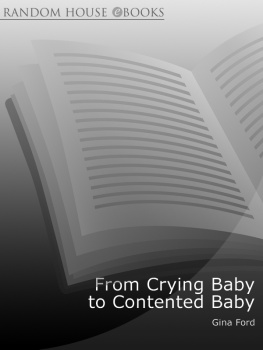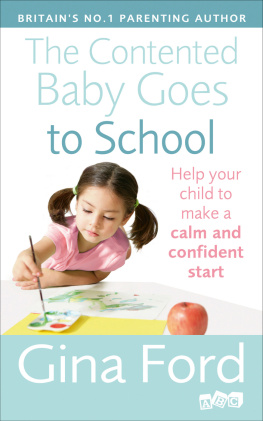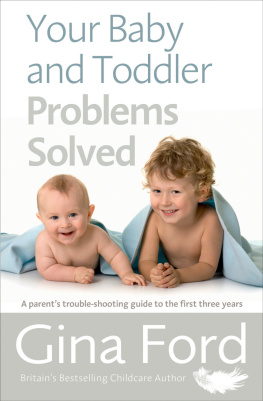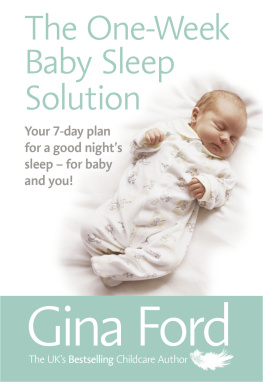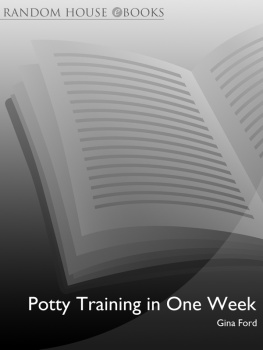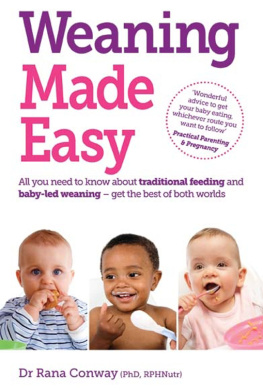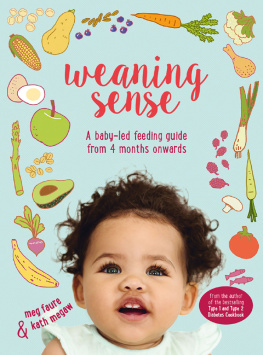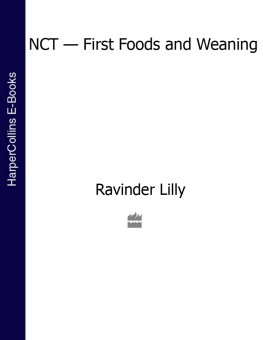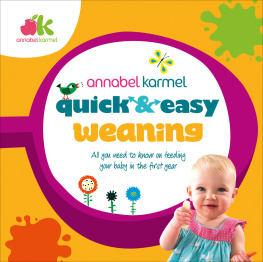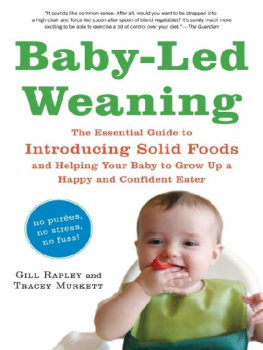About the Book
Weaning your baby on to solid foods is one of the most important milestones during the early months of parenthood. It can also be a daunting prospect, filled with questions such as 'When do I start?' and 'What food should be avoided?' In Top Tips for Weaning Gina Ford provides expert advice to ensure smooth transition from milk to solid foods.
- Understand which foods to introduce and at what age
- Get the balance of milk feeds and solids right
- Eliminate night feeds once solids are introduced
Gina's tried and tested methods and reassuring voice will guide you through this exciting time for you and your baby.
Acknowledgements
I would like to express my thanks and gratitude to the thousands of parents whom I have worked with or advised over the years. Their constant feedback, opinions and suggestions have been an enormous help in writing my books.
I would also like to thank my publisher Fiona MacIntyre and editor Louise Coe for their constant encouragement and faith in my work, and thanks to the rest of the team at Vermilion for all their hard work on the book.
Special thanks are also owed to my agent Emma Kirby, for her dedication and support, and to Laura Simmons, for her efforts in gathering information for the book. Thank you to Kate Brian, the website editor of Contentedbaby.com, Jane Waygood and Rory Jenkins, and the rest of the team at Contentedbaby.com, for their support while I was writing this book and their wonderful work on the website.
And, finally, I am ever grateful for the huge support I receive from the thousands of readers of my books who take the time to contact me a huge thank you to you all and much love to your contented babies.
When to Wean
Over the last few years, the changing and often conflicting advice on when to wean a baby has caused confusion for many new parents. All parents want to establish long-term healthy eating habits for their children, and the aim of this book is to eliminate the confusion and simplify the weaning process. Weaning should and can be an enjoyable and exciting time for both baby and parents. The Contented Little Baby (CLB) methods of weaning have been successful for hundreds of thousands of parents around the world. Following the advice and the tried-and-tested top tips in this book should take the worry out of weaning, and will result in a happy, contented baby who enjoys a healthy and wide-ranging diet.
The most recent Department of Health (DoH) guidelines recommend exclusive breast-feeding for the first six months (26 weeks) of a babys life, i.e. no solids or infant formula during that time. The previous DoH advice was to wean a baby between four and six months and not to give solids before four months (17 weeks).
From the huge amount of feedback I receive from parents, it is evident that there is some confusion surrounding the latest government recommendations. Certainly, there are health professionals who believe that it is not weaning between four and six months that threatens a babys health, but the kind of food the baby is given. It is also clear that there are some babies who do not seem to be satisfied on milk alone for the full six months, resulting in the parents struggling to cope with a miserable, fretful baby as they try to push him to six months on milk alone.
Solid food should never be given before four months (17 weeks) for the following reasons:
 | It takes up to four months for the lining of a babys gut to develop and the kidneys to mature. Introducing solids too early puts pressure on these organs. |
 | Experts believe that introducing solids too early can put a baby at a higher risk of developing allergies. |
 | Before weaning, your baby needs to have good head and neck control and should be able to sit upright, supported, in a chair to reduce the risk of choking. This is rare in babies under four months. |
 | Scientists in Scotland found that a persistent cough was more common in babies who had been given solids before 12 weeks. |
 | Introducing solids too soon can lead to babies cutting back too quickly on milk feeds, which should still be the main source of nutrition until six months. |
 | Early weaning can lead to overfeeding which, research suggests, could put your child at a higher risk of becoming obese in later life and increase his risk of getting cancer, diabetes, heart disease, etc. |
If your baby is six months old (or between four and six months, under guidance from your health visitor or GP) he may be ready for weaning if:
 | He has doubled his birth weight and weighs over 6.8kg (15lb), and your health visitor is happy with his weight gain each week. |
 | He has been taking a full feed from both breasts, or a 240ml (8oz) formula feed, four or five times a day, but still appears to be hungry. |
 | He has been sleeping well at night and at nap times but is waking up earlier and earlier. |
If you and your health visitor agree that you should not introduce solids until six months, it is important to satisfy your babys increased hunger by introducing further milk feeds. Increase the 10/10.30pm feed if you have not already done so. Babies who are taking a full feed at 10/10.30pm and waking in the middle of the night may need a further milk feed in the early hours to get them through to 7am.
In order to meet your babys increased hunger in the daytime, you should feed him at 6/7am, then bring his next feed forward to 10am and offer him a top-up feed prior to his lunchtime nap. He should then be offered another feed at 2/2.30pm, and then, instead of a full feed after the bath, offered a split feed at 5/6.15pm. Introducing these two split feeds in the morning and evening will increase his overall daily milk intake and help satisfy his hunger.
It is more difficult to tell how much milk a baby who is being breast-fed exclusively is receiving. If your baby is over four months and showing most of the above signs that he is ready for weaning, you will need to talk to your health visitor or GP about the choices available to you.
Early weaning
If you have been advised to wean early, it is important to remember that milk is still the most important food for your baby as it provides the right balance of vitamins and minerals. Solids given before six months should be classed as first tastes and fillers in addition to full milk feeds.
Always offer a full milk feed first, before solids, to ensure that your babys daily milk intake does not decrease too rapidly. A baby being weaned early will still need a milk feed at 10/10.30pm until solids are well established. Babies who are weaned between four and six months are usually able to drop the late feed earlier than babies who start solids at six months.
Introducing solids


